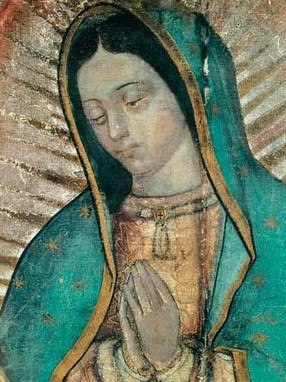 To view Lectionary 12, click here.
To view Lectionary 12, click here.
Basic Question: Our Lady believed God would keep the promises he made to her. That is why St. Elizabeth said to her, “Blessed are you who believed that what was spoken to you by the Lord would be fulfilled.” God has made you many promises. Do you believe that God will keep them?
Central Idea/Doctrine: Both a central idea of the readings and the doctrinal point we will highlight is the Incarnation. As the Nicene Creed summarizes it, “For us men and for our salvation,” God the Son “came down from heaven, and by the Holy Spirit was incarnate of the Virgin Mary, and became man.” Put in another way, in order to do the will of God the Father to save the human race, God the Son became incarnate in the womb of the Blessed Virgin Mary by the power of God the Holy Spirit.
Practical Application: The first three joyful mysteries of the Holy Rosary.
Central Idea/Doctrine
- The first reading is the famous Old Testament prophecy from Micah that the king of Israel will “come forth” from Bethlehem. He will have an ancient lineage. He will rule in the name of God and with the strength of God. His greatness will be worldwide. He shall bring peace. Didn’t this all come true with Christ?
- The Responsorial Psalm proclaims that God is the shepherd/savior of Israel, a nation that definitely needs salvation. The Psalmist pleads for help from God, reminding God that Israel is God’s son. Both the people of Israel collectively and God’s chosen leader for Israel are “the son of man.” Thus, the Psalmist says to God, Israel is Your special possession, so please protect and save him. If You will, then the people of Israel promise to be faithful to You.
- In the second reading, the author of Hebrews—thought to be St. Paul or someone associated with him—talks about two kinds of sacrifices.
- The first kind of sacrifice, based on the Old Testament Mosaic Law, is the temple sacrifice in which animals and fruits of the earth were offered to God. The Chosen People did this on God’s instruction as offerings for sins, in thanksgiving, as a way to praise God, and to accompany their petitions. The sacrifice which took place in the Temple in Jerusalem was something easy to understand—you want something from God, you sacrifice something to him. But this required countless sacrifices. Everyone sinned over and over. Everyone wanted many things during their lives. One generation followed another, all in need. The sacrifices were endless.
- The second kind of sacrifice is what the author of Hebrews was trying to explain. Instead of countless dumb animals being sacrificed, one intelligent and free person would offer himself to do the will of God. The person making the sacrifice was the God-man, Jesus Christ. He offered his “body”—that is, the human nature which was prepared for him in the womb of the Blessed Virgin Mary. This is what the Blessed Trinity desired. The Son of God took on human flesh to dwell with us so as to redeem us from sin and death, making it possible for us to be holy and to enjoy eternal life.
- In other words, Paul is explaining what the Nicene Creed summarizes:
For us men and for our salvation he came down from heaven, and by the Holy Spirit was incarnate of the Virgin Mary, and became man.
- In Trinitarian language, in order to do the will of God the Father to save the human race, God the Son became incarnate in the womb of the Blessed Virgin Mary by the power of God the Holy Spirit.
- The Gospel today is the passage on which is based the Second Joyful Mystery of the Rosary, the Visitation.
- In the Annunciation, the angel Gabriel speaks God’s words to Mary that she will be the Mother of the Savior.
- Here, in the Visitation, through the Holy Spirit, the woman Elizabeth pronounces God’s judgment on Mary and her son: “Blessed art thou among women and blessed is the fruit of thy womb,” who is Jesus. In addition, Elizabeth reveals to us Our Lady’s praiseworthy internal disposition: “Blessed are you who believed that what was spoken to you by the Lord would be fulfilled.”
Practical Application
- Pray the Rosary.
- In the Rosary, we repeat the Our Father, the Hail Mary, the Glory Be. These are deeply Scriptural prayers which touch on the central truths of salvation.
- At the same time, we meditate on the actual key events of our Lord’s Redemptive life. To meditate means to think. To meditate on means to think about. This is done in the presence of God and with his assistance. This “thinking about” includes our reason, memory, imagination, and emotions.
- The first three Joyful Mysteries of the Rosary are about God becoming man, the Incarnation. They are about God’s decision, which he carried out, to enter into human life.
- God involved human beings in this Incarnation—we can see in today’s Gospel the involvement of Mary and Elizabeth.
- It is good for us to stop everything and ponder in our hearts—like the Blessed Virgin Mary—these promises God has made and fulfilled.
- Don’t forget to meditate on what God is promising you. Have you experienced that God really is keeping his promises to you? Our joy and confidence have to be rooted in reality. See if it is true.
The Homiletic Directory offers the following Catechism points and themes for the Fourth Sunday of Advent:
- CCC 148, 495, 717, 2676: the Visitation
- CCC 462, 606-607, 2568, 2824: the Son becomes incarnate to do the Father’s will

Leave a Reply